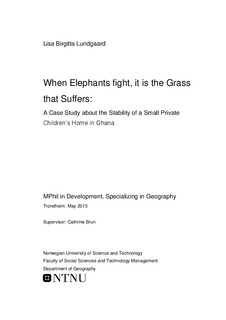When elephants fight, it is the grass that suffers : a case study about the stability of a small private children’s home in Ghana
Master thesis
Permanent lenke
http://hdl.handle.net/11250/2448254Utgivelsesdato
2015Metadata
Vis full innførselSamlinger
- Institutt for geografi [1120]
Sammendrag
The field of development today is teeming with new actors and philanthropists. Now, small private actors and individuals are contributing with services and aid to the poor living in the Global south. These services used to be the responsibilities of governments, market agencies and large NGOs.
By focusing on a children’s home in Central Region, Ghana, this study wishes to analyze the consequences of such small and private initiatives. The research seeks to analyze the interaction between the various actors involved in the children’s home, and to explore their arenas for communication. Moreover, it aims to discuss the accountability of this development project and the responsibilities of each of the actors. The analysis will be made by using the theoretical framework that is based on Norman Long’s theory about the encounters at the interface and combining this with various concepts of accountability, in order to see how they influence each other.
The data was collected using a case study of a children’s home in Ghana, housing 85 children. Qualitative methods were used, and in-depth interviews were conducted with the director of the home, the staff working there, the sponsors, volunteers, other NGO workers assisting the home in various ways, and the National Coordinator in OVCs in Ghana.
The findings reveal that the relationships surrounding the home are filled with tensions because of weak communication, while they are seemingly more efficient and less bureaucratic. The expectations the director and staff, sponsors, and the Department of Social Welfare have towards each other, are not met. Because of unequal power relations, the techniques to prioritize own rationalities have had consequences for the transparency of the home. The informal structures of small, private initiatives, such has this children’s home, have costs for the stability of such projects.
